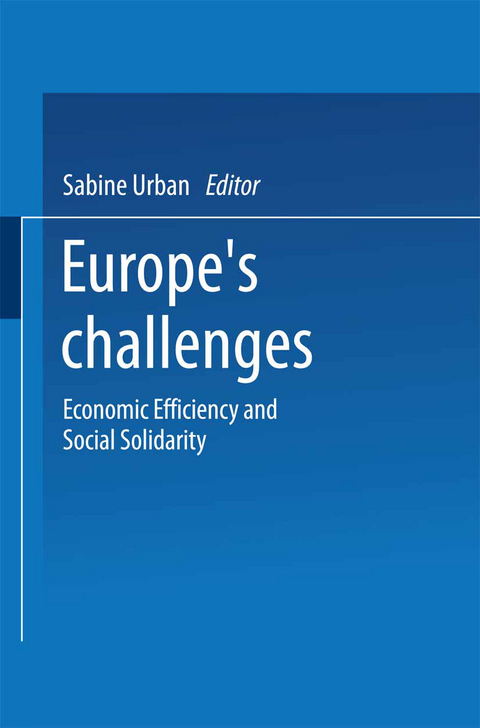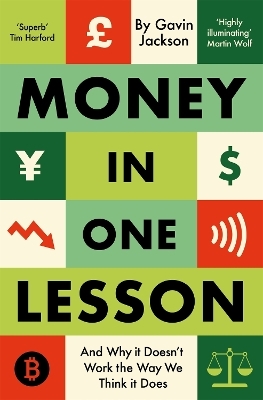
Europe’s Challenges
Economic Efficiency and Social Solidarity
Seiten
1996
|
1996
Betriebswirtschaftlicher Verlag Gabler
978-3-409-13246-6 (ISBN)
Betriebswirtschaftlicher Verlag Gabler
978-3-409-13246-6 (ISBN)
Europe is shaken. Deep-reaching changes are occuring, stimulating the resistance of some and the hope of others. Demand for efficiency is reinforced. Challenges to civilization and social well-being must be overcome.
In this book, well-known experts from 15 countries, discuss themes such as:
A Republican Concept of Corporate Ethics
The Impact of European Policies towards Science and Technology on the European Research Landscape
Consolidation and Expansion of the European Single Insurance Market
European Union and Russia
The current work is the third volume in the se ries "Europe's Economic Future", edited by Strasbourg's Robert Schuman University, under the direction of Professor Sabine Urban, head of the CESAG-IECS research center. This series intends to analyze the European situation -not through idealized models of operation or abstract schemas - rather based on concrete observations, equally elose to the actions and the life of the European citizen as of Europe's corporations and institutions. The studies that are presented here are not, however, simply descriptions; they refer to precise conceptual frameworks and nourish a long-term reflection. This volume, like its predecessors, reflects the diversity which characterizes Europe, rich and stimulating but, at the same time, difficult to manage. Spectacular advances are followed by moments of hesitation. With European construction, new processes of adaptation and new competitive strategies must be implemented by businesses. Public authorities must respect the convergence constraints imposed by the European Union (Maastricht I) and imagine a modified institutional framework for the European Intergovernmental Conference of 1996 (Maastricht II). The citizens of the fifteen countries involved need themselves to be enlightened about the future, to understand how - between independent markets and coordinated policies - a desirable economic and social cohesion in the European area will be realized. Furthermore, the area itself is not fixed; it is evolving between the strengthening of links and the opening of new horizons.
In this book, well-known experts from 15 countries, discuss themes such as:
A Republican Concept of Corporate Ethics
The Impact of European Policies towards Science and Technology on the European Research Landscape
Consolidation and Expansion of the European Single Insurance Market
European Union and Russia
The current work is the third volume in the se ries "Europe's Economic Future", edited by Strasbourg's Robert Schuman University, under the direction of Professor Sabine Urban, head of the CESAG-IECS research center. This series intends to analyze the European situation -not through idealized models of operation or abstract schemas - rather based on concrete observations, equally elose to the actions and the life of the European citizen as of Europe's corporations and institutions. The studies that are presented here are not, however, simply descriptions; they refer to precise conceptual frameworks and nourish a long-term reflection. This volume, like its predecessors, reflects the diversity which characterizes Europe, rich and stimulating but, at the same time, difficult to manage. Spectacular advances are followed by moments of hesitation. With European construction, new processes of adaptation and new competitive strategies must be implemented by businesses. Public authorities must respect the convergence constraints imposed by the European Union (Maastricht I) and imagine a modified institutional framework for the European Intergovernmental Conference of 1996 (Maastricht II). The citizens of the fifteen countries involved need themselves to be enlightened about the future, to understand how - between independent markets and coordinated policies - a desirable economic and social cohesion in the European area will be realized. Furthermore, the area itself is not fixed; it is evolving between the strengthening of links and the opening of new horizons.
Sabine Urban ist Professorin an der Université Robert Schuman und Leiterin des Centre d'Etude des Sciences Appliquées à la Gestion/IECS in Straßburg.
Aus dem Inhalt:
1. Die Europäische Wirtschaftsunion zwischen Solidarität und Effizienz
2. Europäische Union und Rußland
3. Interaktionen zwischen zentralen und peripheren europäischen Börsen
4. Steuerung und Kontrolle des Finanzsystems im neuen Europa
5. Unternehmensethik als "republikanisches Konzept"
| Erscheint lt. Verlag | 1.1.1996 |
|---|---|
| Zusatzinfo | 461 p. 7 illus. |
| Verlagsort | Wiesbaden |
| Sprache | englisch |
| Maße | 155 x 235 mm |
| Gewicht | 852 g |
| Themenwelt | Sozialwissenschaften ► Soziologie |
| Wirtschaft ► Betriebswirtschaft / Management | |
| Wirtschaft ► Volkswirtschaftslehre ► Finanzwissenschaft | |
| Wirtschaft ► Volkswirtschaftslehre ► Makroökonomie | |
| Schlagworte | Communication • ethics • Europa; Wirtschaft • European Union (EU) • Integration • Monetary Union • sustainability |
| ISBN-10 | 3-409-13246-5 / 3409132465 |
| ISBN-13 | 978-3-409-13246-6 / 9783409132466 |
| Zustand | Neuware |
| Haben Sie eine Frage zum Produkt? |
Mehr entdecken
aus dem Bereich
aus dem Bereich
eine Einführung in die Staatsfinanzen
Buch | Hardcover (2024)
Vahlen (Verlag)
CHF 55,70
New Foundations
Buch | Softcover (2022)
Edward Elgar Publishing Ltd (Verlag)
CHF 89,95
and why it doesn't work the way we think it does
Buch | Softcover (2023)
Pan Books (Verlag)
CHF 19,15


